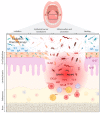The Role of the Innate Immune Response in Oral Mucositis Pathogenesis
- PMID: 38003503
- PMCID: PMC10670995
- DOI: 10.3390/ijms242216314
The Role of the Innate Immune Response in Oral Mucositis Pathogenesis
Abstract
Oral mucositis (OM) is a significant complication of cancer therapy with limited management strategies. Whilst inflammation is a central feature of destructive and ultimately ulcerative pathology, to date, attempts to mitigate damage via this mechanism have proven limited. A relatively underexamined aspect of OM development is the contribution of elements of the innate immune system. In particular, the role played by barriers, pattern recognition systems, and microbial composition in early damage signaling requires further investigation. As such, this review highlights the innate immune response as a potential focus for research to better understand OM pathogenesis and development of interventions for patients treated with radiotherapy and chemotherapy. Future areas of evaluation include manipulation of microbial-mucosal interactions to alter cytotoxic sensitivity, use of germ-free models, and translation of innate immune-targeted agents interrogated for mucosal injury in other regions of the alimentary canal into OM-based clinical trials.
Keywords: inflammation; innate immunity; interventions; oral mucositis.
Conflict of interest statement
The authors declare no conflict of interest.
Figures

Similar articles
-
Systematic review of natural and miscellaneous agents, for the management of oral mucositis in cancer patients and clinical practice guidelines - part 2: honey, herbal compounds, saliva stimulants, probiotics, and miscellaneous agents.Support Care Cancer. 2020 May;28(5):2457-2472. doi: 10.1007/s00520-019-05256-4. Epub 2020 Feb 13. Support Care Cancer. 2020. PMID: 32056010
-
Systematic review of antimicrobials, mucosal coating agents, anesthetics, and analgesics for the management of oral mucositis in cancer patients and clinical practice guidelines.Support Care Cancer. 2020 May;28(5):2473-2484. doi: 10.1007/s00520-019-05181-6. Epub 2020 Feb 12. Support Care Cancer. 2020. PMID: 32052137
-
Oral Mucositis: An Update on Innate Immunity and New Interventional Targets.J Dent Res. 2020 Sep;99(10):1122-1130. doi: 10.1177/0022034520925421. Epub 2020 Jun 1. J Dent Res. 2020. PMID: 32479139 Free PMC article. Review.
-
Dusquetide: A novel innate defense regulator demonstrating a significant and consistent reduction in the duration of oral mucositis in preclinical data and a randomized, placebo-controlled phase 2a clinical study.J Biotechnol. 2016 Dec 10;239:115-125. doi: 10.1016/j.jbiotec.2016.10.010. Epub 2016 Oct 13. J Biotechnol. 2016. PMID: 27746305 Clinical Trial.
-
Systematic review of natural and miscellaneous agents for the management of oral mucositis in cancer patients and clinical practice guidelines-part 1: vitamins, minerals, and nutritional supplements.Support Care Cancer. 2019 Oct;27(10):3997-4010. doi: 10.1007/s00520-019-04887-x. Epub 2019 Jul 8. Support Care Cancer. 2019. PMID: 31286229
Cited by
-
Oral cryotherapy by Kangfuxin for prophylaxis of oral mucositis in patients undergoing autologous hematopoietic stem cell transplantation.Medicine (Baltimore). 2025 Jul 4;104(27):e42867. doi: 10.1097/MD.0000000000042867. Medicine (Baltimore). 2025. PMID: 40629631 Free PMC article. Clinical Trial.
-
Preventive effect of probiotics on oral mucositis induced by anticancer therapy: a systematic review and meta-analysis of randomized controlled trials.BMC Oral Health. 2024 Sep 29;24(1):1159. doi: 10.1186/s12903-024-04955-7. BMC Oral Health. 2024. PMID: 39343876 Free PMC article.
-
Efficacy of Kangfuxin liquid for preventing and treating chemotherapy-induced oral mucositis: a systematic review and meta-analysis of randomized controlled trials.Front Pharmacol. 2025 Apr 8;16:1565345. doi: 10.3389/fphar.2025.1565345. eCollection 2025. Front Pharmacol. 2025. PMID: 40264666 Free PMC article.
-
A Two-Stage Phase 2, Multicenter, Randomized, Double-Blind, Placebo-Controlled Study to Evaluate the Safety and Efficacy of Ec-18 in Altering the Severity and Course of Oral Mucositis Secondary to Chemoradiation Therapy for Squamous Cell Cancers of the Head and Neck.Cancers (Basel). 2025 May 14;17(10):1663. doi: 10.3390/cancers17101663. Cancers (Basel). 2025. PMID: 40427161 Free PMC article.
References
-
- Logan R.M., Gibson R.J., Bowen J.M., Stringer A.M., Sonis S.T., Keefe D.M.K. Characterisation of mucosal changes in the alimentary tract following administration of irinotecan: Implications for the pathobiology of mucositis. Cancer Chemother. Pharmacol. 2008;62:33–41. doi: 10.1007/s00280-007-0570-0. - DOI - PubMed
Publication types
MeSH terms
Substances
LinkOut - more resources
Full Text Sources
Research Materials

